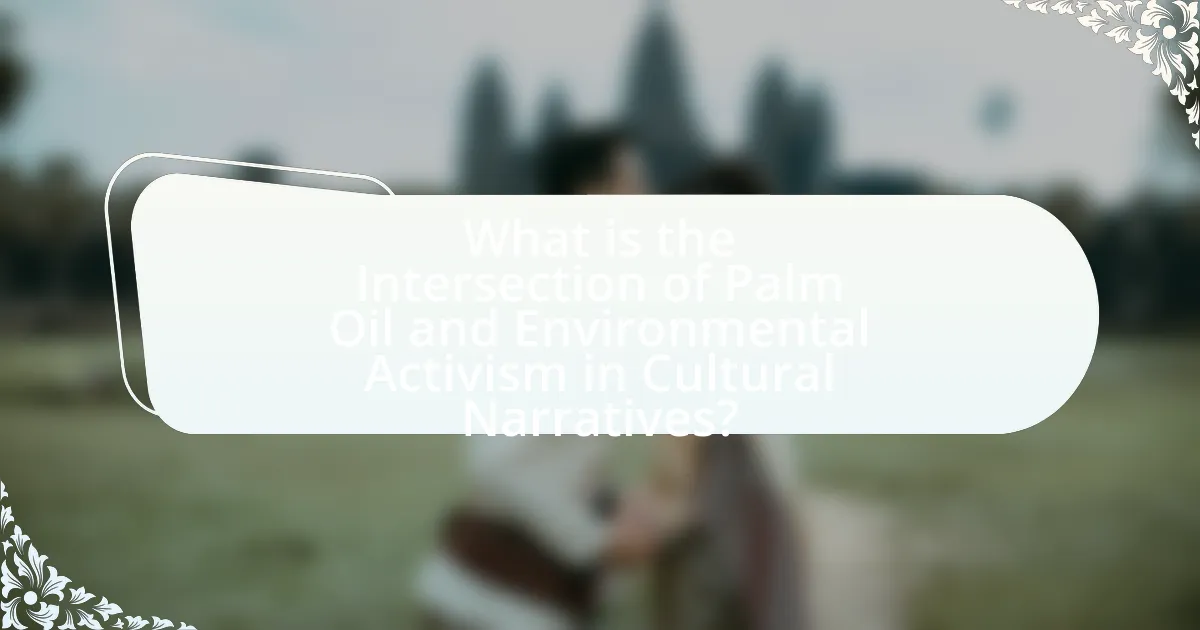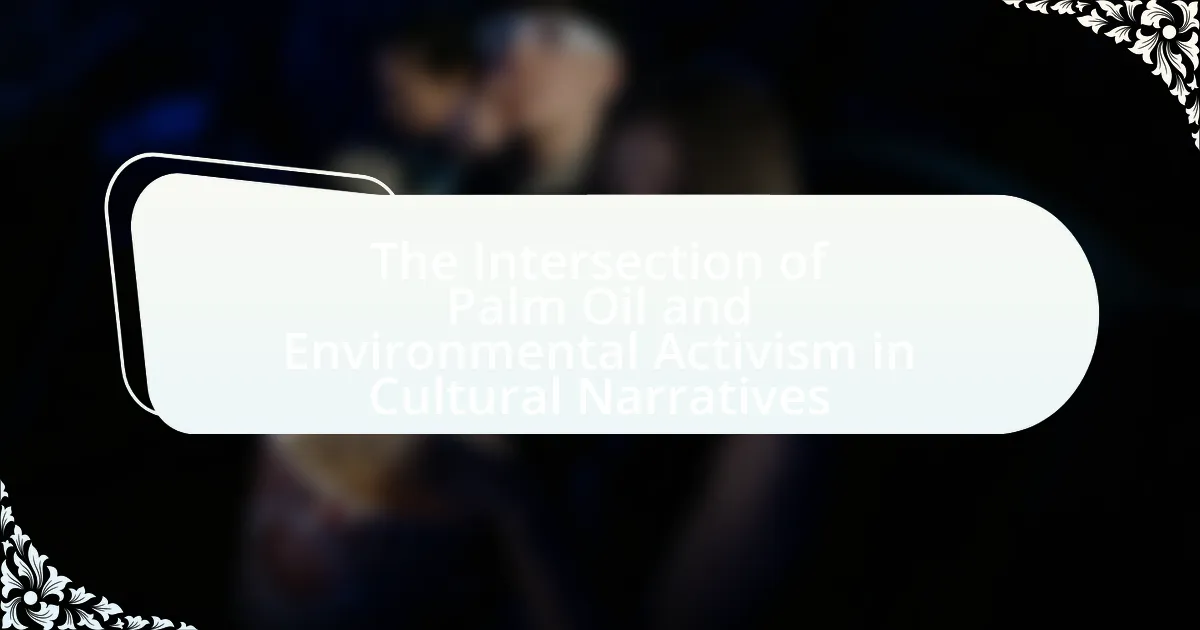The article examines the intersection of palm oil production and environmental activism within cultural narratives, highlighting the tension between economic development and ecological preservation. It details the environmental impacts of palm oil, including deforestation, habitat destruction, and biodiversity loss, while emphasizing the role of activists in advocating for sustainable practices. The discussion includes the influence of cultural narratives on public perception, consumer choices, and corporate accountability, as well as the key players involved in the palm oil industry, such as multinational corporations, NGOs, and local communities. Additionally, it explores strategies for promoting sustainable palm oil and the challenges faced in changing cultural narratives surrounding this contentious issue.

What is the Intersection of Palm Oil and Environmental Activism in Cultural Narratives?
The intersection of palm oil and environmental activism in cultural narratives highlights the conflict between economic development and ecological preservation. Palm oil production is linked to deforestation, habitat destruction, and biodiversity loss, which has prompted environmental activists to advocate for sustainable practices. For instance, the World Wildlife Fund reports that palm oil cultivation is a leading cause of rainforest destruction in Southeast Asia, affecting species like orangutans and tigers. Cultural narratives often frame palm oil as a symbol of corporate greed versus grassroots environmentalism, emphasizing the need for ethical consumerism and sustainable sourcing. This dynamic shapes public perception and policy, influencing consumer choices and corporate accountability in the palm oil industry.
How does palm oil production impact the environment?
Palm oil production significantly impacts the environment by contributing to deforestation, habitat destruction, and greenhouse gas emissions. The expansion of palm oil plantations often leads to the clearing of tropical rainforests, which are vital for biodiversity and carbon storage. For instance, a study published in the journal “Nature” found that between 1990 and 2010, palm oil cultivation was responsible for the loss of approximately 6 million hectares of forest in Indonesia alone. This deforestation not only threatens endangered species like orangutans and tigers but also releases stored carbon dioxide, exacerbating climate change. Additionally, the use of fertilizers and pesticides in palm oil farming can lead to soil and water pollution, further harming local ecosystems.
What are the ecological consequences of palm oil cultivation?
Palm oil cultivation leads to significant ecological consequences, primarily deforestation, loss of biodiversity, and greenhouse gas emissions. Deforestation occurs as vast areas of tropical forests are cleared to make way for palm oil plantations, resulting in habitat destruction for numerous species, including endangered ones like orangutans and tigers. According to the World Wildlife Fund, approximately 90% of palm oil is produced in Indonesia and Malaysia, where deforestation rates have accelerated, contributing to the loss of over 3 million hectares of forest annually. This habitat loss not only threatens wildlife but also disrupts ecosystems and reduces biodiversity. Furthermore, the clearing of forests releases stored carbon dioxide, exacerbating climate change; the Rainforest Foundation reports that palm oil production is responsible for about 10% of global deforestation-related emissions. Thus, the ecological consequences of palm oil cultivation are profound and multifaceted, impacting both the environment and global climate.
How does deforestation for palm oil affect biodiversity?
Deforestation for palm oil significantly reduces biodiversity by destroying habitats essential for various species. This land conversion leads to the loss of flora and fauna, with estimates indicating that palm oil plantations can result in a 90% decline in species richness in affected areas. Additionally, the International Union for Conservation of Nature reports that the expansion of palm oil cultivation threatens over 200 species, including orangutans and tigers, by fragmenting their habitats and disrupting ecosystems.
What role does environmental activism play in the palm oil industry?
Environmental activism plays a crucial role in the palm oil industry by advocating for sustainable practices and raising awareness about the environmental impacts of palm oil production. Activists highlight issues such as deforestation, loss of biodiversity, and greenhouse gas emissions associated with unsustainable palm oil cultivation. For instance, organizations like Greenpeace and the Rainforest Action Network have campaigned against companies that source palm oil from deforested areas, leading to commitments from major brands to source certified sustainable palm oil. This activism has resulted in increased consumer awareness and pressure on companies to adopt more environmentally friendly practices, thereby influencing industry standards and policies.
How do activists raise awareness about palm oil’s environmental impact?
Activists raise awareness about palm oil’s environmental impact through campaigns, educational initiatives, and social media outreach. They organize protests and events to highlight deforestation, habitat destruction, and biodiversity loss associated with palm oil production. For instance, organizations like Greenpeace and the Rainforest Action Network publish reports and infographics that detail the negative effects of palm oil cultivation on ecosystems. Additionally, activists leverage social media platforms to share compelling visuals and personal stories, reaching a broader audience and encouraging consumer action against unsustainable palm oil products. These efforts are supported by statistics indicating that palm oil production is responsible for significant greenhouse gas emissions and the loss of critical wildlife habitats, reinforcing the urgency of their message.
What strategies do environmental organizations use to combat palm oil production?
Environmental organizations combat palm oil production through advocacy, certification schemes, and consumer awareness campaigns. Advocacy efforts include lobbying governments and corporations to adopt sustainable practices and enforce regulations that protect forests and biodiversity. Certification schemes, such as the Roundtable on Sustainable Palm Oil (RSPO), promote sustainable palm oil production by setting standards that producers must meet to be certified. Additionally, consumer awareness campaigns educate the public about the environmental impacts of palm oil, encouraging them to choose products that use sustainably sourced palm oil or alternatives. These strategies collectively aim to reduce the demand for unsustainable palm oil and promote responsible consumption.
How are cultural narratives shaped by the palm oil debate?
Cultural narratives are shaped by the palm oil debate through the framing of environmental, economic, and social issues surrounding palm oil production. The debate highlights the conflict between economic development and environmental sustainability, influencing public perception and cultural values. For instance, the destruction of rainforests for palm oil plantations is often depicted in media as a significant environmental crisis, leading to a narrative that prioritizes conservation and biodiversity. This framing is supported by studies, such as those from the World Wildlife Fund, which report that palm oil expansion contributes to habitat loss for endangered species, thus reinforcing the urgency of environmental activism in cultural discourse. Additionally, the economic benefits touted by palm oil producers are often countered by narratives emphasizing the rights of indigenous communities and the need for ethical consumption, further shaping cultural attitudes towards palm oil.
What stories are told about palm oil in different cultures?
Palm oil is often depicted in various cultural narratives as a symbol of both economic opportunity and environmental concern. In Southeast Asia, particularly in Indonesia and Malaysia, palm oil is celebrated for its role in economic development and poverty alleviation, with stories highlighting the livelihoods it provides to millions of farmers. However, these narratives are juxtaposed with cautionary tales about deforestation, loss of biodiversity, and the displacement of indigenous communities, which are prevalent in environmental activism. For instance, the Dayak people of Borneo share stories of their ancestral lands being threatened by palm oil plantations, emphasizing the cultural and spiritual significance of their environment. These contrasting stories reflect the complex relationship between palm oil production and cultural identity, illustrating how economic benefits are often weighed against environmental degradation and social justice issues.
How do these narratives influence public perception of palm oil?
Narratives surrounding palm oil significantly shape public perception by framing it as either a sustainable resource or an environmental threat. For instance, environmental activism often highlights deforestation, biodiversity loss, and climate change associated with palm oil production, leading to negative public sentiment. According to a 2020 study published in the journal “Environmental Science & Policy,” 70% of consumers expressed concern about the environmental impact of palm oil, influenced by media portrayals and activist campaigns. Conversely, narratives that emphasize sustainable practices and certifications, such as the Roundtable on Sustainable Palm Oil (RSPO), can foster a more positive view, suggesting that palm oil can be produced responsibly. This duality in narratives directly affects consumer choices, policy-making, and industry practices, illustrating the powerful role of storytelling in shaping perceptions of palm oil.

What are the key players in the palm oil and environmental activism landscape?
The key players in the palm oil and environmental activism landscape include multinational corporations, non-governmental organizations (NGOs), local communities, and governmental bodies. Multinational corporations such as Wilmar International and Cargill dominate the palm oil industry, driving production and trade. NGOs like Greenpeace and the World Wildlife Fund (WWF) advocate for sustainable practices and raise awareness about the environmental impacts of palm oil cultivation, including deforestation and biodiversity loss. Local communities, often affected by palm oil plantations, play a crucial role in activism by voicing their rights and seeking sustainable alternatives. Governmental bodies are essential in regulating the industry and implementing policies aimed at promoting sustainable palm oil production. These players collectively influence the dynamics of palm oil production and environmental activism, shaping policies and practices in the sector.
Who are the major stakeholders in the palm oil industry?
The major stakeholders in the palm oil industry include palm oil producers, consumers, governments, non-governmental organizations (NGOs), and investors. Palm oil producers, such as large plantations and smallholder farmers, are directly involved in cultivation and harvesting. Consumers drive demand for palm oil products, which are prevalent in food, cosmetics, and biofuels. Governments regulate the industry through policies and trade agreements, while NGOs advocate for sustainable practices and environmental protection. Investors provide capital and influence corporate practices through their investment choices. These stakeholders collectively shape the dynamics of the palm oil industry, impacting environmental and social outcomes.
What roles do governments, corporations, and NGOs play?
Governments, corporations, and NGOs play critical roles in the palm oil industry and its environmental impact. Governments regulate the industry through policies and legislation aimed at sustainable practices, such as Indonesia’s moratorium on new palm oil plantations to combat deforestation. Corporations drive demand for palm oil and can influence sustainability through their supply chain practices, with companies like Unilever committing to sourcing sustainable palm oil to reduce environmental harm. NGOs advocate for environmental protection and social justice, raising awareness about the negative impacts of palm oil production and pressuring both governments and corporations to adopt more sustainable practices, as seen in campaigns by organizations like Greenpeace.
How do local communities engage with palm oil production?
Local communities engage with palm oil production primarily through participation in cultivation, labor, and economic activities related to the industry. Many communities rely on palm oil as a source of income, with smallholder farmers contributing significantly to the global supply; for instance, smallholders account for approximately 40% of palm oil production in countries like Indonesia and Malaysia. Additionally, local communities often form cooperatives to enhance their bargaining power and access to markets, which can lead to improved livelihoods. However, engagement is also marked by activism against unsustainable practices, as communities advocate for environmental protection and sustainable development, reflecting a growing awareness of the ecological impacts of palm oil cultivation.
What are the main environmental organizations involved in palm oil activism?
The main environmental organizations involved in palm oil activism include Greenpeace, the World Wildlife Fund (WWF), and the Rainforest Action Network (RAN). Greenpeace has been instrumental in raising awareness about the deforestation caused by palm oil production and has campaigned against companies that source unsustainable palm oil. The WWF focuses on promoting sustainable palm oil practices through initiatives like the Roundtable on Sustainable Palm Oil (RSPO), which aims to ensure that palm oil is produced in an environmentally responsible manner. RAN works to protect forests and promote sustainable practices by holding corporations accountable for their palm oil sourcing. These organizations collectively contribute to significant advocacy efforts aimed at reducing the environmental impact of palm oil cultivation.
How do these organizations collaborate with local communities?
Organizations collaborate with local communities by engaging in participatory approaches that include dialogue, capacity building, and co-management of resources. For instance, environmental NGOs often work with local farmers to implement sustainable agricultural practices that reduce the negative impacts of palm oil cultivation. This collaboration is evidenced by initiatives such as the Roundtable on Sustainable Palm Oil (RSPO), which promotes standards that involve local stakeholders in decision-making processes. Additionally, partnerships with community leaders help ensure that local knowledge and cultural values are integrated into environmental strategies, fostering a sense of ownership and responsibility among community members.
What campaigns have been most effective in promoting sustainable palm oil?
The most effective campaigns in promoting sustainable palm oil include the Roundtable on Sustainable Palm Oil (RSPO) and the Palm Oil Innovation Group (POIG). The RSPO, established in 2004, has set global standards for sustainable palm oil production, engaging stakeholders across the supply chain, which has led to the certification of millions of hectares of palm oil plantations. The POIG, formed in 2013, aims to enhance the RSPO standards by addressing issues such as deforestation and human rights abuses, thereby pushing for higher sustainability criteria. Both campaigns have successfully raised awareness and encouraged companies to commit to sourcing sustainable palm oil, evidenced by the increasing number of brands pledging to use certified sustainable palm oil in their products.
How do cultural narratives influence stakeholder actions?
Cultural narratives significantly influence stakeholder actions by shaping perceptions, values, and behaviors related to environmental issues. For instance, narratives that emphasize the importance of sustainability and the protection of biodiversity can motivate stakeholders, such as consumers and investors, to support environmentally friendly practices in the palm oil industry. Research by the World Wildlife Fund indicates that storytelling around the impacts of palm oil production on local ecosystems can lead to increased consumer demand for sustainable palm oil products, thereby prompting companies to adopt more responsible sourcing policies. This demonstrates that cultural narratives not only inform stakeholder beliefs but also drive tangible actions towards environmental activism and sustainability in the palm oil sector.
What impact do cultural stories have on policy-making regarding palm oil?
Cultural stories significantly influence policy-making regarding palm oil by shaping public perception and awareness of environmental issues. These narratives often highlight the ecological consequences of palm oil production, such as deforestation and biodiversity loss, which can mobilize public support for stricter regulations. For instance, campaigns that incorporate local cultural stories about the land and its importance can lead to increased advocacy for sustainable practices, prompting policymakers to consider these narratives in their decisions. Research indicates that storytelling can effectively communicate complex environmental issues, making them more relatable and urgent, thus impacting legislative agendas and fostering a shift towards more sustainable palm oil policies.
How do narratives shape corporate social responsibility in the palm oil sector?
Narratives significantly shape corporate social responsibility (CSR) in the palm oil sector by influencing public perception and stakeholder expectations. These narratives often highlight environmental degradation, social injustices, and the impact of palm oil production on biodiversity, compelling companies to adopt more sustainable practices. For instance, the widespread narrative surrounding deforestation linked to palm oil has led major corporations, such as Unilever and Nestlé, to commit to sourcing sustainable palm oil, as evidenced by their participation in the Roundtable on Sustainable Palm Oil (RSPO). This shift is driven by consumer demand for ethical products and the need to mitigate reputational risks associated with negative environmental narratives.

What are the future implications of the intersection of palm oil and environmental activism?
The future implications of the intersection of palm oil and environmental activism include increased regulatory pressures on palm oil production and a shift towards sustainable practices. As environmental activism gains momentum, consumers are demanding transparency and sustainability in palm oil sourcing, leading companies to adopt more eco-friendly practices. For instance, the Roundtable on Sustainable Palm Oil (RSPO) has seen membership growth, indicating a trend towards certification and sustainable production methods. Additionally, activists are likely to influence policy changes, pushing governments to enforce stricter environmental regulations on palm oil cultivation, which could result in reduced deforestation rates and improved biodiversity conservation.
How can sustainable practices be integrated into palm oil production?
Sustainable practices can be integrated into palm oil production by adopting certification standards such as the Roundtable on Sustainable Palm Oil (RSPO), which promotes environmentally responsible cultivation methods. These methods include maintaining biodiversity, reducing greenhouse gas emissions, and ensuring fair labor practices. For instance, RSPO-certified plantations are required to implement measures that protect high conservation value areas and minimize deforestation, which is crucial given that palm oil production is linked to significant habitat loss. Additionally, employing agroforestry techniques can enhance soil health and increase carbon sequestration, further supporting sustainability in palm oil production.
What are the benefits of adopting sustainable palm oil certifications?
Adopting sustainable palm oil certifications provides environmental, economic, and social benefits. Environmentally, these certifications promote practices that reduce deforestation, protect biodiversity, and minimize greenhouse gas emissions, contributing to climate change mitigation. Economically, certified sustainable palm oil can enhance market access and consumer trust, as demand for ethically sourced products increases; for instance, the Roundtable on Sustainable Palm Oil (RSPO) reported a 30% increase in sales for certified products in recent years. Socially, these certifications improve the livelihoods of farmers by ensuring fair wages and working conditions, fostering community development, and promoting transparency in supply chains.
How can technology aid in sustainable palm oil farming?
Technology can aid in sustainable palm oil farming by enhancing monitoring, improving yield efficiency, and promoting transparency in supply chains. Precision agriculture technologies, such as satellite imagery and drones, allow farmers to monitor crop health and optimize resource use, leading to reduced deforestation and better land management. For instance, the use of remote sensing can identify areas of illegal deforestation, enabling timely interventions. Additionally, blockchain technology can provide traceability in the supply chain, ensuring that palm oil is sourced sustainably and ethically, which is crucial for meeting consumer demand for responsible products. These technological advancements contribute to the overall sustainability of palm oil farming by minimizing environmental impact and promoting responsible agricultural practices.
What role will cultural narratives play in shaping future activism?
Cultural narratives will play a crucial role in shaping future activism by framing issues, influencing public perception, and mobilizing communities. These narratives provide context and meaning to social movements, enabling activists to connect their causes to broader cultural values and historical experiences. For instance, the narrative surrounding palm oil production has evolved to highlight environmental degradation and indigenous rights, which has galvanized support for sustainable practices. Research indicates that storytelling in activism can increase engagement and empathy, as seen in campaigns that effectively communicate the impacts of palm oil on ecosystems and local communities. This connection between cultural narratives and activism underscores the importance of narrative strategies in driving social change.
How can storytelling be used to promote environmental awareness in palm oil issues?
Storytelling can effectively promote environmental awareness in palm oil issues by creating emotional connections and illustrating the real-life impacts of palm oil production on ecosystems and communities. For instance, narratives that highlight the destruction of rainforests and the displacement of indigenous peoples due to palm oil plantations can evoke empathy and drive action. Research indicates that stories that include personal experiences and local voices resonate more with audiences, making them more likely to engage in advocacy or change their consumption habits. A study by the World Wildlife Fund found that storytelling can increase public understanding of complex environmental issues, leading to greater support for sustainable practices and policies.
What are the potential challenges in changing cultural narratives around palm oil?
Changing cultural narratives around palm oil faces significant challenges, primarily due to entrenched economic interests and cultural perceptions. The palm oil industry is a major economic driver in several countries, contributing to livelihoods and national economies, which complicates efforts to shift narratives that may portray it negatively. Additionally, cultural perceptions often associate palm oil with traditional practices and local customs, making it difficult to alter these views without facing resistance from communities that rely on these practices.
Moreover, misinformation and lack of awareness about sustainable practices in palm oil production further hinder narrative change. For instance, many consumers are unaware of the differences between sustainably sourced and unsustainable palm oil, leading to a generalized negative perception of the product. This complexity is compounded by the influence of powerful lobbying groups that advocate for the palm oil industry, which can overshadow environmental concerns and sustainable alternatives.
These factors create a multifaceted challenge in changing cultural narratives, as economic, cultural, and informational barriers must be addressed simultaneously to foster a more sustainable understanding of palm oil.
What practical steps can individuals take to support sustainable palm oil initiatives?
Individuals can support sustainable palm oil initiatives by choosing products certified by the Roundtable on Sustainable Palm Oil (RSPO). By purchasing RSPO-certified products, consumers directly contribute to sustainable practices that minimize deforestation and promote biodiversity. In 2020, RSPO reported that over 19 million metric tons of palm oil were produced sustainably, demonstrating the impact of consumer choices on environmental practices. Additionally, individuals can advocate for transparency in supply chains by urging companies to disclose their palm oil sources and support brands committed to sustainability. Engaging in community awareness campaigns and educating others about the importance of sustainable palm oil further amplifies individual efforts, fostering a collective movement towards responsible consumption.
How can consumers make informed choices regarding palm oil products?
Consumers can make informed choices regarding palm oil products by researching the sourcing and sustainability certifications of these products. Many brands provide information on whether their palm oil is sustainably sourced, often indicated by certifications such as RSPO (Roundtable on Sustainable Palm Oil), which ensures that palm oil is produced in an environmentally responsible manner. According to the World Wildlife Fund, sustainable palm oil production can help mitigate deforestation and habitat destruction, which are critical issues linked to conventional palm oil farming. By prioritizing products with these certifications, consumers can support environmentally friendly practices and contribute to reducing the negative impacts associated with palm oil production.
What actions can activists take to strengthen cultural narratives against unsustainable palm oil practices?
Activists can strengthen cultural narratives against unsustainable palm oil practices by engaging in community education and awareness campaigns. These campaigns can highlight the environmental and social impacts of palm oil production, such as deforestation and loss of biodiversity, which are critical issues supported by studies indicating that palm oil cultivation is responsible for significant habitat destruction. Additionally, activists can collaborate with local artists and storytellers to create culturally relevant content that resonates with communities, thereby fostering a deeper understanding of the consequences of unsustainable practices. Research shows that culturally tailored messaging is more effective in influencing public perception and behavior, making this approach vital for driving change.

Leave a Reply